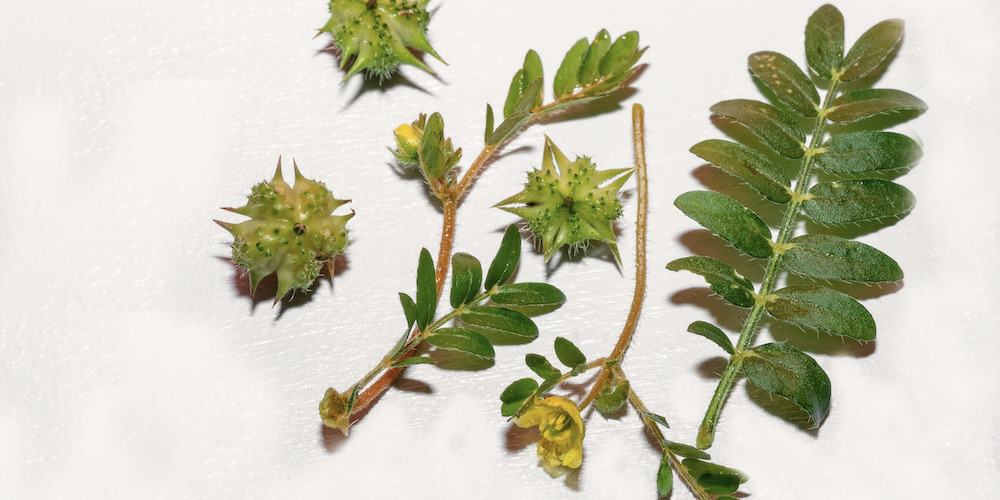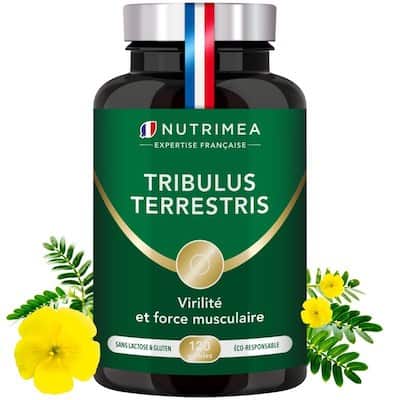BENEFITS OF TRIBULUS
✓ Improves sexual activity
✓ Enhances sports performance
✓ Balances the nervous system
✓ Protects the heart
✓ Protects the liver and kidneys
What is tribulus?
If the name tribulus terrestris doesn’t ring a bell, you might know it as “Maltese cross”, “devil’s thorn” or even “caltrap”. Originating from the Mediterranean, tribulus is a key plant in Ayurvedic and traditional Chinese medicine.
Tribulus is a perennial plant belonging to the Zygophyllaceae family. Thanks to its great adaptability, it grows in many regions of the world, including those with arid climates. Thus, it is found both in Asia (China, Japan, Korea…) and in Africa, South America, and even Europe.
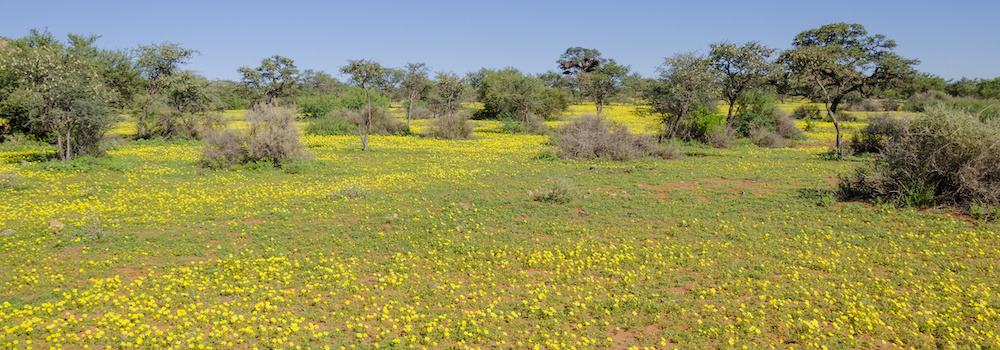
It can reach a height of 90 cm. It has hairy leaves, with silvery hairs. From April to October, the plant is adorned with yellow flowers that quickly give way to very thorny fruits resembling the Maltese cross. The name “tribulus” indeed refers to this: it is derived from the Greek “tribolos” which designates a thorny fruit with 3 spikes (although the tribulus fruit has 5). The extensive network of fibrous roots and the long lifespan of its seeds make it an invasive plant in certain regions.
While tribulus is a botanically fascinating plant, it’s also a medicinal plant used for millennia. The fruits, roots, and leaves possess numerous properties.
In Ayurvedic and Chinese medicine, tribulus is indicated for toning the body, protecting the liver and kidneys, and enhancing sexual performance.
In Europe, it was from the 1980s that research on tribulus multiplied and its consumption increased. It has an excellent reputation among athletes as it promotes muscle gain, increases physical strength, and speeds up recovery.
This research has also helped popularize it. And most of the studies we found are very recent!
Today, tribulus is primarily known for its aphrodisiac properties and its benefits on sexual activity. It is offered as a dietary supplement, in the form of tablets, capsules, powder, or tincture. Generally, the entire plant is used. However, the highest concentration of saponins, its active compounds, is found in the fruits. India is the leading producer of tribulus terrestris.
Nutritional Composition
- Saponins: protodioscin, dioscin, furostanol, diosgenin
- Phytosterols: beta-sitosterols
- Flavonoids: kaempferol, quercetin
- Alkaloids: harmane, harmine
- Vitamin C
- Minerals and trace elements: potassium, calcium, sodium, phosphorus, iron
- Proteins
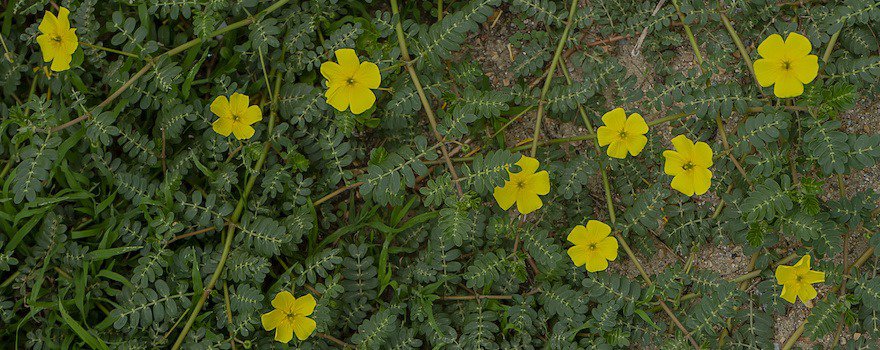
Buying tribulus: my selection
I recommend tribulus from Nutrimea laboratory. This supplement is made from a standardized extract containing 40% saponins, its main active ingredient.
Nutrimea is a French brand launched in 2012. We recommend this company because their products are made from controlled-origin raw materials, and their quality is certified by an ISO 22000:2005 certified laboratory.
By using the promo code “DARWIN10” you help us keep our blog alive, but more importantly, you get 10% off all their products.
❤ I love: The controlled origin, great quality/price ratio, and many discounts offered (5% through the loyalty program, buy 3 products, get the 4th free)
★ Customer reviews: 4.5/5
☞ Quantity: 120 capsules / 4 months of treatment
✔ Discount code -10%: DARWIN10
Benefits
🔥 Improves sexual activity
For both men and women, tribulus is a valuable libido ally and enhances overall sexual activity. Thus, it improves sexual performance, fosters and stimulates desire.
This property is due to the action of tribulus on hormones involved in sexuality. The saponins it contains, including protodioscin, diosgenin, and dioscin, are capable of regulating testosterone production in men and estrogen in women.
These two sex hormones are directly linked to libido, sexual desire, energy, and vitality. That’s why a low level of testosterone and estrogen can cause a decrease in libido or sexual performance.
Tribulus does not increase the production of sex hormones but regulates it according to the rate. For this, the saponins act on the luteinizing hormone secreted in the brain. This hormone is responsible for stimulating testosterone production in the testes and regulating the secretion of progesterone and estrogen in women.
In this study from the National University of Singapore conducted on rats, researchers demonstrated the aphrodisiac effect of tribulus extract.
🔥 Reduces Sexual Disorders
In addition to stimulating sexual activity, tribulus is also capable of reducing disorders of erection, fertility, spermatogenesis (process of sperm production), or even ovulation.
In men, tribulus saponins increase sperm production, improve their quality and mobility. In women, they stimulate the secretion of FSH (follicle-stimulating hormone) and LH (luteinizing hormone), hormones involved in the ovulation process and menstrual cycle.
This study from the National University of Singapore, conducted on rats, shows that tribulus protodioscin acts particularly on intracavernous pressure, which is the penile swelling during erection.
This recent study from 2019 by the Tabriz University of Medical Sciences in Iran, conducted on men, concludes that the consumption of tribulus leads to an improvement in sperm parameters (quantity, motility, and morphology).
🚴🏻♀️ Improves Athletic Performance
Tribulus is a natural anabolic, meaning it promotes tissue building and muscle mass gain. That’s why it is appreciated by athletes and bodybuilding enthusiasts.
This activity is closely related to the hormonal properties of tribulus. By stimulating the secretion of luteinizing hormone, the saponins act on testosterone levels. Furthermore, testosterone promotes muscle development by enabling muscle hypertrophy (thickening of muscle fibers).
Additionally, testosterone improves recovery after physical exercise and enhances the release of fats. It also plays an important role in mental well-being!
In this study from the Shanghai University of Sport and Columbia University in New York, conducted on rats, the tribulus saponins increased performance, body mass, and gastrocnemius mass (at the calf level).
This other study conducted on 15 male boxers, showed a reduction in muscle damage and an improvement in anaerobic performance after taking tribulus.
🙏 Balances the Nervous System
Tribulus is also beneficial for the nervous system. It improves sleep quality, reduces stress, restlessness, and mood swings, and alleviates depression symptoms…
Its hormonal action contributes largely to mental well-being. Indeed, estrogen and testosterone affect behavior and mood. That’s why a drop in the concentration of sex hormones can lead to depression, irritability, hyper-emotivity, loss of self-confidence…
Tribulus is also one of the adaptogenic plants, like ginseng, maca, or rhodiola, which increase the body’s ability to manage stress.
This study from various Indian universities, conducted on mice, shows that harmine, an alkaloid found in tribulus, contributes to the plant’s beneficial effects on the nervous system.
❤️ Protects the heart
Tribulus is a heart-protective plant. By reducing hypertension, it supports heart function and protects against cardiovascular diseases. Its content of beta-sitosterols and flavonoids, antioxidant molecules, are the source of these effects.
In this study from Jilin Medical College, conducted on patients suffering from angina pectoris, the saponins in tribulus significantly improved symptoms. They notably caused dilation of the coronary artery and improved circulation.
♻️ Protects the liver and kidneys
In Ayurvedic and Chinese medicine, tribulus is traditionally used to stimulate and protect the liver and kidneys from free radicals. It is indicated for combating liver diseases, kidney problems, and urinary issues.
In this study from Panjab University (India), conducted directly on renal epithelial cells, tribulus extract blocked the formation of oxalate crystals involved in urinary stones.

How to consume tribulus?
Tribulus in tablets
Tribulus tablets or capsules are made after drying and grinding the whole plant or just the seeds. It is a form that is easily found in pharmacies, health food and specialty stores, or online.
To maximize benefits, tablets or capsules must be sufficiently standardized in saponins (40 to 45 %).
Tribulus in powder form
It can also be found in powder form, to mix in water, fruit juice, yogurt, vegetable milk… Preferably choose organic tribulus, sun-dried, untreated, and GMO-free.
Tribulus in mother tincture
The mother tincture of tribulus is generally obtained by hydro-alcoholic maceration of the plant’s roots. However, this format is harder to find and not necessarily more effective. Especially since the mother tincture contains a lot of alcohol.
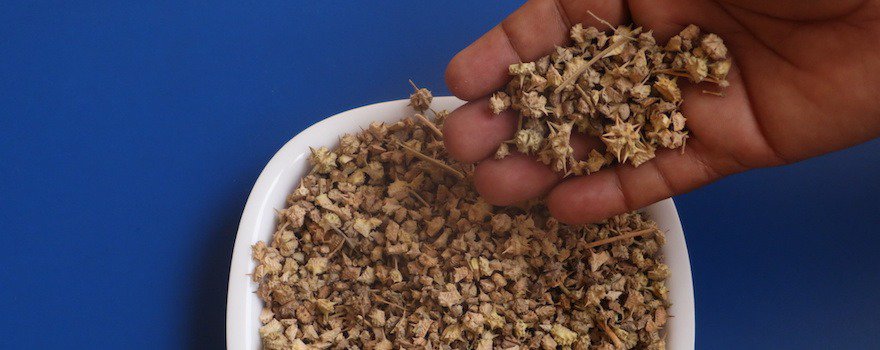
Tribulus and medicinal plants
To enhance libido and boost the aphrodisiac action of tribulus, it can be beneficial to combine it with maca (Lepidium Meyenii). This tuber increases sexual energy, erectile function, improves fertility, and facilitates ovulation. The tribulus/ginseng combination is also very beneficial for libido.
To regain restorative sleep and a nervous balance, it should be noted that the action of tribulus is multiplied when combined with ashwagandha (Withania somnifera), guarana (Paullinia cupana), or rhodiola.
Sportspeople can also take spirulina (Arthrospira platensis) along with tribulus to improve their endurance and physical form.
Dosage
⚖️The recommended dosage of tribulus varies between 600 and 1200 mg per day.
⏳Intakes should be taken at noon or in the afternoon rather than in the evening. They are divided into 2 times during the day. Generally, it is recommended not to take tribulus continuously. The best approach is to have 20-day courses, each spaced by a 2-week break. The first effects are felt after 3 to 4 days. Consult your doctor before starting a tribulus course.
💊In tablets: up to 3 per day for 400 mg tablets or capsules
🥄In powder form: 1 level teaspoon per day (about 1 g)
🧪In mother tincture: 15 drops, 2 times per day
Contraindications and side effects
Tribulus is a safe plant. Nevertheless, its consumption is not recommended for the following people:
- As a precaution, young children and pregnant or breastfeeding women should avoid taking tribulus.
- People under medical treatment (antihypertensives, antidiabetics…) should seek their doctor’s advice before consuming it.
- Due to the action of tribulus on hormones, its consumption is contraindicated for people suffering from hormone-dependent cancers (breast and prostate cancer).
At recommended dosages, tribulus does not present any side effects. In case of excessively high doses or prolonged use, the following adverse effects may occur:
- Gastric reflux.
- Stomach aches.
- Insomnia.
- Anxiety, distress, and agitation.
History, culture, and market of tribulus
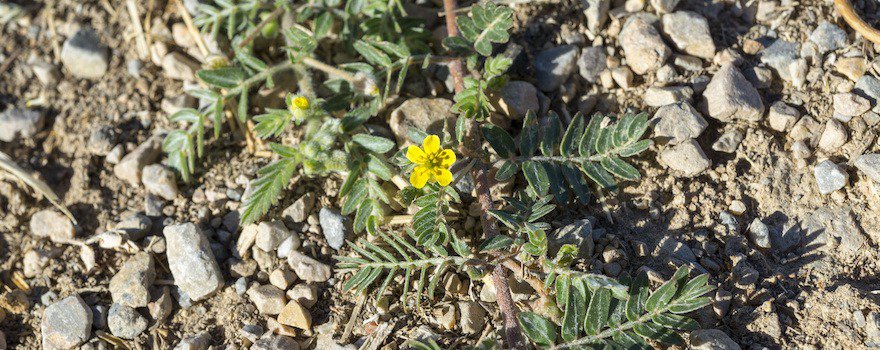
It was first ayurvedic medicine that highlighted its properties. In India, it was Charaka, an itinerant physician of the 1st century and one of the main founders of Ayurveda, who first described the properties of the plant known as “gokshura.” Charaka recognized it for its aphrodisiac, tonic, and diuretic properties.
Later, tribulus became part of Chinese medicine. Even today, tribulus is a valuable plant in India, China, Japan, and Korea.
In Europe, harmine, one of the compounds of tribulus, was first isolated in 1841. Since then, studies on the plant have continued to multiply.
Anecdote: due to its fruit’s spiny capsule shape, the plant lent its name to an ancient weapon used by the Roman army known as the tribulus. Once placed on the ground, its sharp point would pierce the feet of men and horses.
File created by Julia Perez and Charlotte Jean
Sources and scientific studies
Gauthaman K, Adaikan PG, Prasad RN, 2002. Aphrodisiac properties of Tribulus Terrestris extract (Protodioscin) in normal and castrated rats.
Gauthaman K, Ganesan AP, Prasad RN, 2003. Sexual effects of puncturevine (Tribulus terrestris) extract (protodioscin): an evaluation using a rat model.
Sanagoo S, Sadeghzadeh Oskouei B, Gassab Abdollahi N, Salehi-Pourmehr H, Hazhir N, Farshbaf-Khalili A, 2019. Effect of Tribulus terrestris L. on sperm parameters in men with idiopathic infertility: A systematic review.
Yin L, Wang Q, Wang X, Song LN, 2016. Effects of Tribulus terrestris saponins on exercise performance in overtraining rats and the underlying mechanisms.
Ma Y, Guo Z, Wang X, 2017. Tribulus terrestris extracts alleviate muscle damage and promote anaerobic performance of trained male boxers and its mechanisms: Roles of androgen, IGF-1, and IGF binding protein-3.
Saurabh Chhatre, Tanuja Nesari, Gauresh Somani, Divya Kanchan, and Sadhana Sathaye, 2014. Phytopharmacological overview of Tribulus terrestris.
Wang B, Ma L, Liu T, 1990. 406 cases of angina pectoris in coronary heart disease treated with saponin of Tribulus terrestris.
Anshu Aggarwal, Simran Tandon, Sugam Singla, Chanderdeep Tandon, 2010. Diminution of Oxalate Induced Renal Tubular Epithelial Cell Injury and Inhibition of Calcium Oxalate Crystallization in vitro by Aqueous Extract of Tribulus terrestris.
Photos: Adobe Stock. Coen van den Broek / Unsplash.


